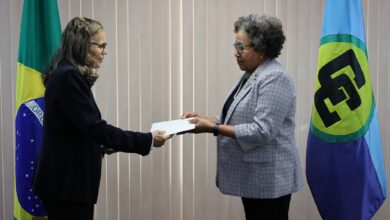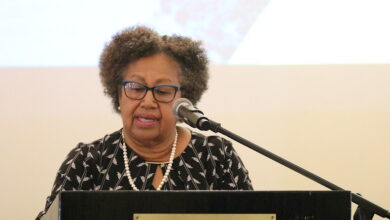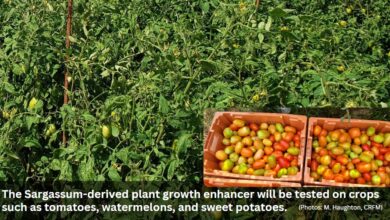Today the Conference of Commonwealth Caribbean Countries discussed and agreed on joint action on a wide range of subjects which affect the economic development of the participating countries. Subjects discussed include Economic Aid from Canada and a scheme for Mutual Technical Aid between Commonwealth Caribbean Countries and other Commonwealth countries. The Conference expressed concern over the Corporation tax on British industry recently proposed by the U.K. Government and put on record strong views that arrangements should be made to ensure that the investment of the U.K. capital in the Caribbean area is not discouraged or discriminated against.
The Conference took note of the fact that the establishment of a regional office of ECLA (Economic Commission for Latin America) in Trinidad will assist with the collection and processing of economic information including statistics, thus facilitating regional economic co-operation.
On the proposal to establish a permanent Secretariat the Conference agreed that it may at some time be advisable to have such a Secretariat and decided to reconsider the question at the next conference of Commonwealth Caribbean Countries.
COMMUNIQUE ISSUED AT THE CONCLUSION OF THE THIRD CONFERENCE OF COMMONWEALTH CARIBBEAN COUNTRIES, 8-10 MARCH 1965, GEORGETOWN, GUYANA
The Third Conference of Commonwealth Caribbean Countries opened on Monday morning, March 8th, at the Chamber of the House of Assembly, Public Buildings, Georgetown, under the Chairmanship of the Prime Minister of British Guiana, the Honourable Forbes Burnham and ended today, March 10.
The Acting Prime Minister of Jamaica, Mr. Donald Sangster, the Deputy Prime Minister of Trinidad and Tobago, Dr. Patrick Solomon and the Prime Minister of Barbados, Mr. Errol Barrow led the delegations of their respective countries.
All sessions of the Conference were marked by a most cordial atmosphere.
The Conference has arrived at the following decisions:
|
1. SUGAR
It was unanimously agreed that the resolution passes at the recent Barbados meeting of Representatives of the Governments of Barbados, British Guiana, Jamaica, Trinidad and Tobago; the British West Indies Sugar Association, the Caribbean Cane Farmers Association and the Caribbean Congress of Labour on the sale of sugar under the Commonwealth Sugar Agreement be approved and the press statement issued by the meeting ratified. 2. SALE OF WEST INDIAN RUMS IN CANADA The Conference took note of the sharp decline in the sale of West Indian rums in Canada and decided to recommend to the Governments of participating territories that a Working Party be set up to examine as a matter of urgency the …. Molasses and trade in and out of the Caribbean area. 3. BANANAS The Conference noted that the meeting of British Caribbean Banana Producers scheduled to take place did not take place as planned and therefore did not proceed with this item s it affected parties who were not present. 4. PROPOSED BAUXITE CONFERENCE It was agreed that as a preliminary step that Jamaica and British Guiana should exchange all information including contracts and proceed with a detailed examination prior to holding a larger conference. 5. PROPOSED U.K. CORPORATION TAX ON BRITISH INDUSTRY The Conference expressed concern at the possible effect of the Corporation tax which the U.K. Government proposed to introduce, and put on record strong views that arrangements should be made to ensure that the investment of U.K. capital in the Caribbean area was not thereby discouraged. 6. U.S. HOLIDAY TAX ON U.S. CITIZENS The Conference resolved that in view of the fact that the trade balance between the Caribbean area and the U.S.A. was greatly in favour of the latter the U.S. Government should be approached to exempt Caribbean territories from the proposed restrictions on U.S. tourist to those territories. 7. CANADA/WEST INDIES CONFERENCE ON ECONOMIC AID The Conference decided to recommend to the Governments of participating territories that a working party of officials of the territories should exchange relevant documents on the question and should then meet to go into technical details. At a later stage there should be a meeting at Ministerial level to formulate the approach of the area in discussion with the Canadian Government. 8. A SCHEME FOR MUTUAL TECHNICAL AID BETWEEN COMMONWEALTH CARIBBEAN TERRITORIES AND OTHER COMMONWEALTH COUNTRIES It was agreed that this matter should be studied by the Working Party on Canada/West Indies Conference on Economic Aid etc. and that the matter might also be raised at the Commonwealth Prime Ministers Conference in London. 9. PARTICIPATION OF BRITISH GUIANA IN THE UNIVERSITY OF THE WEST INDIES The Conference, while not expressing an opinion on the details, welcomed the proposals of the Government of British Guiana to achieve close association with the University of the West Indies but felt that it was a matter for the Government of British Guiana and the University of Guyana to take up with the proper authorities. 10. IMMIGRATION POLICY ON RECRUITMENT OF STAFF TO UNIVERSITY OF THE WEST INDIES It was agreed to recommend that Governments of participating territories should give favourable consideration to the suggestion tat U.W.I. staff or students should not be subject to the requirement to have work permits or similar requirements. 11. WEST INDIAN STUDENTS ASSOCIATION (INC.) The Conference decided to recommend to the Governments of participating territories that sympathetic consideration should be given to the request for assistance from the West Indian Students Association Inc. of New York towards the establishment of a revolving fund to assist students in distress, and that the object of the purchase of a suitable building for a Students Centre and Hostel in New York required more careful examination in regard to the dispersal of West Indian students in U.S.A. 12. REGIONAL ECONOMIC CO-OPERATION The Conference took note of the fact that the establishment of the Regional Office of ECLA (Economic Commission for Latin America) in Trinidad would assist with the collection and processing of economic information including statistics, thus facilitating regional economic co-operation. 13. SPECIALIST MEDIICAL FACILITES IN THE AREA It was agreed to recommend that the Government of participating territories should make available medical facilities to citizens of other participating territories subject to local needs and in all cases on the most reasonable terms possible. 14. SECONDMENT, ATTACHMENT AND EXCHANGE OF SPECIALIST OFFICERS It was agreed that the British Guiana Government should take the initiative in ascertaining from each participating territory (a) its needs for specialist assistance; and (b) its specialist resources and should then consider how a suitable scheme of specialist assistance might be put into operation. 15. RECIPROCAL PENSIONS LEGISLATION It was agreed that participating territories should wherever necessary enact such legislation. 16.POSITION FOLLOWING THE ISSUE OF NEW CURRENCIES IN THE REGION It was agreed to recommend to the Governments of territories represented at Conference and the other territories in the Eastern Caribbean that their new currencies should continue to be accepted as legal tender on a reciprocal basis. 17.CREDIT CONTROL WITH SPECIAL REFERENCE TO HIRE- PURCHASE Participating territories agreed to exchange information on this subject. 18.UNITED KINGDOM IMMIGRATION POLICY The Conference considered this matter and passed the following resolution:
19.WEST INDIES SHIPPING SERVICE Conference took note of action so far taken regarding the future of West Indies shipping. 20. WINDING UP OF AFFAIRS OF FORMER WEST INDIES FEDERATION Participating countries who were former members of the W.I. Federation agreed to recommend to their Governments that pending the final report of the Interim Commissioner consideration should be given as to how the surplus arising from the liquidation of assets of the Federation should be utilised. 21.MEMBERSHIP OF THE ORGANISATION OF AMERICAN STATES The Conference was in agreement that the most careful consideration should be given by Governments of the participating territories to the question of membership of the Organisation of American States, having special regard to the circumstances of Caribbean territories. 22.PERMANENT CONFERENCE SECRETARIAT The Conference agreed that it may at some time be advisable to have such a Secretariat and decided to reconsider the question at the next Conference of Commonwealth Caribbean Countries. 23.CARIBBEAN EXAMINATIONS COUNCIL The Conference having noted that the principle of the Establishment of a Caribbean Examinations Council was accepted by a previous Conference, hoped that it would be possible to proceed with the proposals of the Working party in the report with the least possible delay. 24.NEXT MEETING It was decided that the next Conference would be held in Barbados in the first half of 1966 on a date to be mutually agreed. |
RESOLUTION PERTAINING TO THE SALE OF SUGAR UNDER THE COMMONWEALTH SUGAR AGREEMENT
The following resolution was passed by a meeting of the Governments of Barbados, British Guiana, Jamaica, Trinidad and Tobago, the British West Indies Sugar Association, the Caribbean Cane Farmers’ Association and the Caribbean Congress of Labour on the 5th and 6th March, 1956 in Bridgetown, Barbados.
WHEREAS the Commonwealth Sugar Agreement as the fundamental condition states that the price paid to the sugar-exporting members of the Agreement shall be reasonably remunerative t o the efficient producer;
WHEREAS the West Indies sugar producers are efficient producers; and
WHEREAS the parties to the Commonwealth Sugar Agreement agreed that the price-fixing arrangements set out in Articles 20 to 25 of the Commonwealth Sugar Agreement be suspended and the detailed discussions should be held in 1965 of the Ministry’s proposals and of any other proposals which may be put forward.
BE IT RESOLVED
| (1) that this Conference records its appreciation of the work done by the West Indies delegation to the Commonwealth Sugar Agreement negotiations in November and December, 1964, and endorses the delegation’s refusal to accept a price less than £46 per ton for Negotiated Price Quota sugar;
(2) that the basic price to be received for Negotiated Price Quota sugar, however this price is calculated, must be not less than the price receive in 1964 for N.P.Q. sugar produced by the Commonwealth; and (3) that the West Indies delegation be instructed by this Conference to resume negotiations with Her Majesty’s Government as soon as possible in order to agree a new price formula for negotiated Price sugars and that such delegation shall include representatives from Trade Unions in the Caribbean area. |
BE IT FURTHER RESOLVED that the objectives set out above cannot be achieves by the technical delegation, further representations should be made by a delegation of Ministers representing all sugar exporting countries in the West Indies to negotiate a new price formula with Her Majesty’s Government.
RESOLUTION RE PROPOSED HOLIDAY ON U.S. CITIZENS GOING ABROAD
Since the proposal to impose an exit tax on U.S. Citizens proceeding on holiday abroad will adversely affect tourism in the Caribbean which, in varying degree, is of considerable economic significance to the territories in the area;
And since the U.S.A. in turn derives some reciprocal benefit from visits to the U.S.A. by persons from all parts of the West Indies;
And since the balance of trade between the territories of the area and the United States of America is greatly in favour of the latter;
Conference unanimously resolved that, in addition to representatives which individual Governments have made or propose to make, a joint approach should be made to the U.S Government that the proposed legislation to impose an exit tax and the proposal to reduce the duty-free exemption for purchases made by tourist from $100 (U.S.) a wholesale prices to $50 (U.S.) at retail prices applicable only to goods accompanying the purchasers should not be applied to countries in the Caribbean area.
RESOLUTION RE UNITED KINGDOM IMMIGRATION POLICY
The Conference of Heads of Government of the Commonwealth Caribbean Countries notes the recent declaration of the Prime Minister of Great Britain on the question of Commonwealth immigration.
The Conference regrets that no emphasis has been given by the U.K. Government to the benefits which have enured to certain important sectors of the British economy, e.g. hospital services and transport, as a result of the work done by immigrants from these Caribbean countries particularly.
The Conference considers that regulation of Commonwealth immigration into the U.K. should be predicated only on the ability of industry in the United Kingdom to absorb the available supply of workers from these territories.
The Conference firmly believes that the solution most likely that the solution most likely to be beneficial both to the United Kingdom and to the Caribbean countries will be found primarily by substantial capital investment in, and increased technical assistance to those countries whose resources are still under-developed, some of which also have the potential to absorb migrants, and also by increased trade favourable terms.
The Conference therefore urges the Government of the United Kingdom to take the initiative in promoting development within these areas, so as to reduce the need for movement from within them to countries outside.
The Conference invites the attention not only of the U.K. Government, but of the Governments of other developed Countries, to these proposals.






